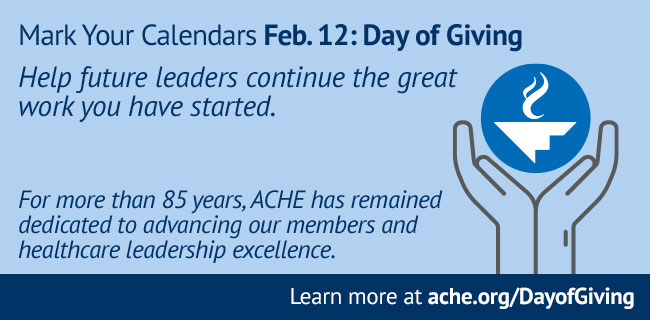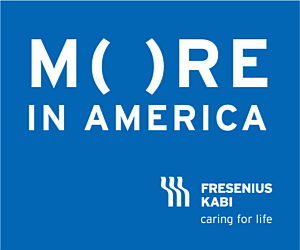
- Benefits Bulletin:
Access Lifelong Learning at Reduced Rates - Free Webinar: Keeping Your Career on Track in Uncertain Times
- Share the Gift of Life on National Donor Day
- New Book: The Healthcare Consultant’s Handbook: Career Opportunities and Best Practices
- CMS Calls on Hospitals, Healthcare Providers to Participate in Payment Surveys
- Three Low-Cost Interventions to Advance Equity in Medicine Now
Benefits Bulletin: Access Lifelong Learning at Reduced Rates
Do you know that as a member, you can embrace the power of knowledge during every stage of your career at reduced rates? Membership in ACHE gives you access to face-to-face local, regional and national education programs and virtual seminars at reduced rates. It also offers automatic savings on books published by Health Administration Press. These discounts also apply to registration fees for ACHE’s 2021 Congress on Healthcare Leadership. If members register by Feb. 22, they can take advantage of additional savings with the early-bird registration fee and pay only $449. If you need a refresher on all of the member benefits available to you through ACHE, visit ache.org/Membership and explore all that awaits you.
We are proud to offer these exclusive member benefits, and we thank you for being part of the ACHE community.
Free Webinar: Keeping Your Career on Track in Uncertain Times
As the challenges of 2020 continue in the new year, adaptability will be an essential skill for remaining on track with your career. On Feb. 11, join ACHE for a complimentary webinar, “How to Keep You and Your Career on Track in These Virtual, Volatile Times,” for practical tips on using untapped career resources and opportunities. Jointly hosted by two of ACHE’s new online communities for Asian healthcare leaders and LGBTQ healthcare leaders, this webinar, worth 1 ACHE Qualified Education credit, will explore how to advance your career—or keep it from derailing—through this extended period of societal uncertainty. Register today.
To stay up to date on the latest from our three new, free online communities for LGBTQ healthcare leaders, Asian healthcare leaders and physician executives, follow these steps:
- Log in to my.ache.org.
- Under “Helpful Links” on the right-hand side, click the last option, “My Communities.”
- Click the “Add” button to choose the online communities you wish to join. An MD or DO degree is required to join the Physician Executives Community.
- Watch your inbox for your welcome email and instructions to access your new community! The email will arrive within 24 hours.
If you have any questions or you don’t receive your welcome email, please contact communitymanager@ache.org.
Share the Gift of Life on National Donor Day
Feb. 14, well-known for the Cupid’s arrows and hearts that accompany Valentine’s Day, is also National Donor Day. As of 2019, 165 million people in the United States have registered as donors, according to the U.S. Department of Health and Human Services’ Health Resources & Services Administration. However, as of this writing, HRSA reports there are still 107,984 men, women and children waiting for a life-saving organ transplant.
ACHE recommends in one of its Policy Statements that all healthcare executives work to increase the supply of available organs for transplantation. Learn more about organ and tissue donation and how healthcare leaders can become more involved in sharing the gift of life.
New Book: The Healthcare Consultant’s Handbook: Career Opportunities and Best Practices
“To find success as a consultant, one must try to consolidate lessons drawn from a broad range of experiences,” writes Scott A. Mason, DPA, FACHE, in the first chapter of his new book The Healthcare Consultant’s Handbook: Career Opportunities and Best Practices. Mason, managing partner of SKM Advisors LLC, draws on more than 40 years of experience to reveal the realities of management consulting for healthcare organizations and the traits and strengths necessary for success. In his new book, published by Health Administration Press, he offers insight into the essential role of the healthcare consultant and looks at the common challenges healthcare consultants face and how best to overcome them. Learn more about this new title and order your copy today.
CMS Calls on Hospitals, Healthcare Providers to Participate in Payment Surveys
Hospitals and healthcare providers can help improve the accuracy of Medicare payments if they participate in surveys conducted by the U.S. Bureau of Labor Statistics, according to the Centers for Medicare & Medicaid Services. The U.S. government uses these surveys to make economic decisions that affect the entire healthcare system. For example, CMS uses the surveys to adjust Medicare fee-for-service payments each year, affecting approximately $300 billion in payments. Other key users of the surveys include the Federal Reserve Bank and the U.S. Congress.
CMS says that recently, many healthcare providers did not complete the survey, which can reduce the representativeness of the data and increase volatility in estimates. Therefore, CMS implores hospitals and healthcare providers to participate in a survey if contacted by BLS. Doing so can help ensure the data are as accurate and valid as possible. Participation is voluntary, confidential and the data are only used for statistical purposes.
To learn more, please visit the following resources:
- BLS survey respondents webpage
- BLS confidentiality pledge and laws webpage
- CMS market basket data webpage
- BLS geographic information webpage (Visit this page to contact a BLS expert or get information on surveys, data and reports.)
Three Low-Cost Interventions to Advance Equity in Medicine Now
“With the world’s attention turned to COVID-19 and its devastating (and as yet unknown) consequences, it’s easy to allow the current crisis to delay progress on the work that many of us have been leading for decades to champion gender equity and anti-racism,” write the authors of a recent article on HealthcareExecutive.org. However, they caution that healthcare leaders cannot allow the pandemic to quash gains made in this area.
“While we recognize that our nation’s healthcare system is reeling from the financial upheaval of COVID-19, there are immediate and low-cost steps institutions can take now to send a powerful message that women and people of color belong,” writes Mary I. O’Connor, MD, Sheila Dugan, MD, and Ije-Enu Udeze Nwosu. Learn about the three steps healthcare executives can take today to change culture within hospitals and healthcare systems. Visit HealthcareExecutive.org/WebExtras for more content you won’t find anywhere else.


